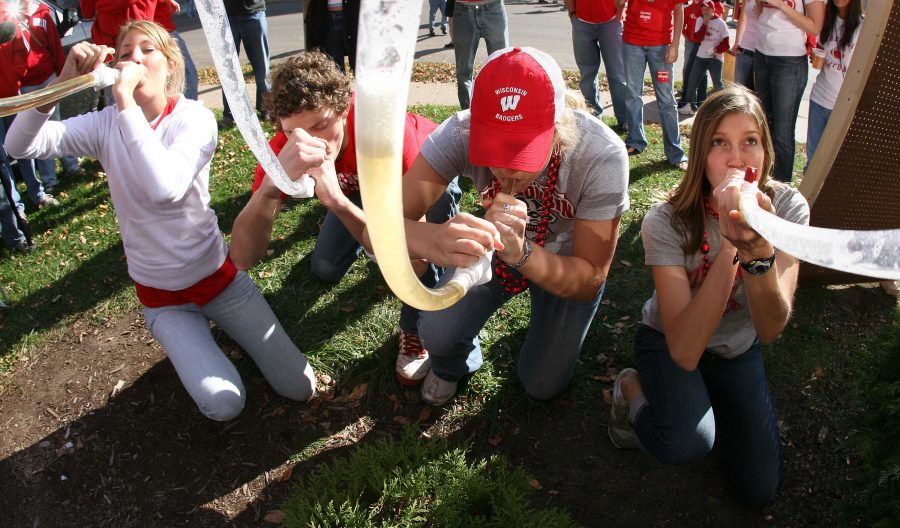To recover from the stress of a busy week, Shaina Pomerantz and her friends let loose on the weekends, beginning at home and ending the night at an Oakland bar.
Pomerantz, a 22-year-old senior sociology major, said she knows binge drinking is unhealthy, but that it’s an inherent part of the college environment.
“There’s a whole issue in college culture where you have to drink to get drunk or drink to blackout,” Pomerantz said.
Brian Suffoletto, an associate professor of emergency medicine at Pitt, and the Student Health Center have tapped into this culture through another constant in students’ lives: text messaging.
Pitt’s Student Health Service worked with Suffoletto for two years to design and implement PantherTRAC, a Pennsylvania Liquor Control Board-funded text message intervention system. PantherTRAC uses positive reinforcement to discourage binge drinking among Pitt students.
On Thursdays, PantherTRAC texts students who have signed up for the alerts and asks if they plan on drinking during the upcoming weekend. If students reply, “Yes,” the system sends back messages like“Be safe.”
The Health Center invited freshmen to sign up for PantherTRAC in the fall after promising results from a UPMC study. Students who the University sanctioned for an alcohol violation are also required to sign up for the system.
Suffoletto led the nine-month study in which 765 young adults 18 to 25 years old all used text message intervention. The results, which came out Nov. 18, showed a decrease in instances of binge drinking for up to six months after the texts stopped.
“[Text message intervention] is an evolution in how we help young adults achieve better health,” Suffoletto said.
PantherTRAC became available to freshmen beginning in August as part of the Panther Bridge program to promote responsible drinking. Since then, Marian Vanek, the director of Student Health Service, said it has had an 85 percent success rate in lowering instances of binge drinking.
The binge drinking threshold, according to the National Institute on Alcohol Abuse and Alcoholism, is four drinks for women and five drinks for men in the span of two hours.
If a student’s response is over the binge drinking threshold, PantherTRAC warns them about the risks of heavy drinking, which Suffoletto said include illness, injury or poor health in the future.
Vanek said taking action against binge drinking is absolutely necessary to enforce healthy behaviors on campus.
“Many students, approximately 22 percent, arrive on campus having experienced binge drinking and will continue to do so following their arrival,” Vanek said in an email.
Suffoletto said his study is more about creating healthy drinking habits than it is about promoting abstinence and that text messaging is the best way to enhance education.
“Text messaging is a pervasive and ubiquitous communication modality,” Suffoletto said.
At Pitt, an online program called AlcoholEdu is already required for first-year students to learn about the risks of heavy drinking. Pomerantz said the first-year AlcoholEdu program wasn’t enough for her.
“As an incoming freshman, I didn’t [care] about [AlcoholEdu],” Pomerantz said. She said she’d be interested in a program that “doesn’t condemn” those who choose to drink.
According to Vanek, PantherTRAC is meant to work alongside already-established programs like AlcoholEdu and Personal Education, Assistance and Referral to increase their effectiveness.
Rachel Bender, a senior psychology major, said she drank the most during her freshman year, which is the target audience for AlcoholEdu and PantherTRAC.
“After my first semester at Pitt, I was pretty much done,” Bender said in reference to her drinking habits. “[On] Halloween, I physically picked up and carried — for blocks — two people home.”
Suffoletto said text message intervention proactively targets students who drink in college.
“[Young people should] learn how to build healthy habits around social drinking,” Suffoletto said. “Such that you can have fun without going over a dangerous limit, because there’s very little benefit to drinking a lot and there’s a whole lot of repercussions.”
Author’s note: A previous version of this article said that Pitt invited all students to join PantherTRAC in August, when in fact it was only freshmen and select students. The article has been updated to reflect these changes.



